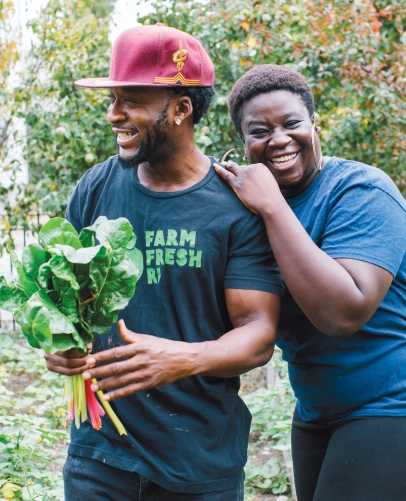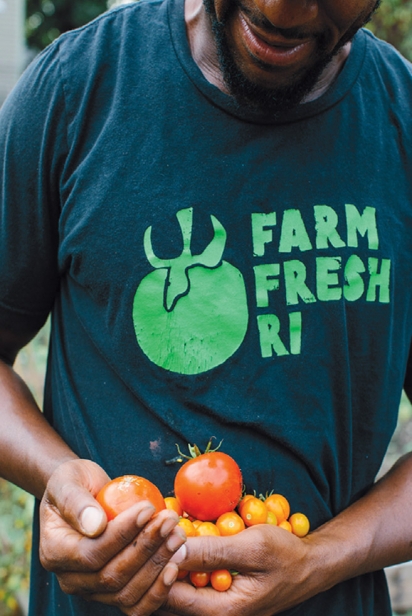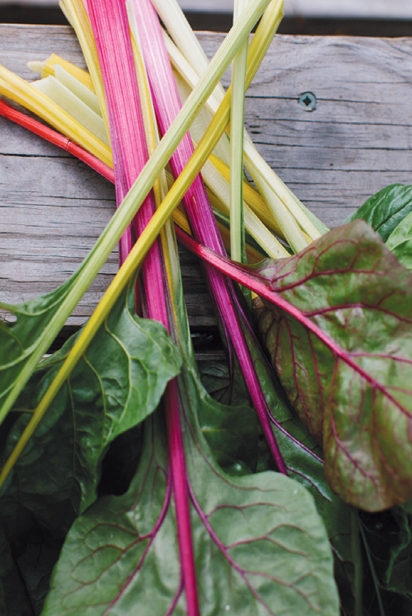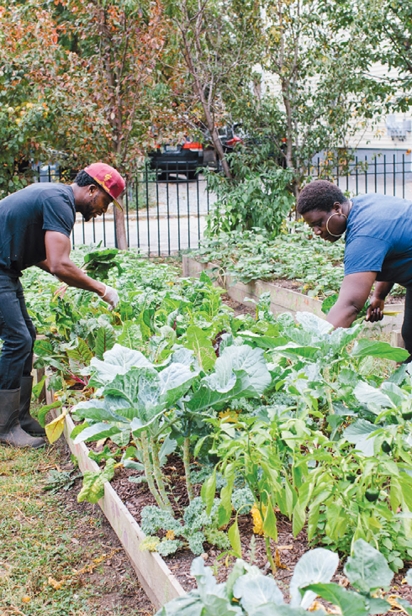Abundance Farm
Big Vision and Hard Work Nourish a West End Neighborhood
“It’s a small space but it’s gonna produce so much food,” explains chef, farmers market manager, food justice organizer and web developer Georgina Sarpong of how the farm she now runs with her partner Quincy Ansumana got its name: Abundance Farm.
Nestled practically in the shadow of the looming Cranston Street Armory on the corner of Parade and Cranston streets in the West End of Providence, the small space she speaks of is indeed abundant. When she and I meet on an early September morning, greens, herbs and tomatoes spill out of the 20 raised beds. Pear, quince and the sweet cherry trees just past their prime ring the perimeter and offer a gentle buffer from city streets.
Sarpong and Ansumana are rejuvenating this piece of land, which is owned by the West Elmwood Housing Development Corporation’s (WEHDC) Sankofa Initiative and had been a community garden managed by Sarpong for six years. Sarpong is also a board member of WEHDC. After a period of dormancy, Sarpong and Ansumana decided to transform the communal garden into their own small farm with a mission of providing local, affordable food to neighbors and the micro-businesses connected to the Sankofa Initiative.
Throughout the 2020 growing season, they sold $10 to $14 bags of produce through the WEHDC’s email list and their own social media every few weeks, selling out each time but always reserving enough to share with friends and neighbors.
Sarpong’s experience as the former food service director for Farm Fresh RI’s Harvest Kitchen showed her how smaller food businesses and those just starting out often can’t afford to buy local ingredients from services like Farm Fresh’s Market Mobile distribution program because both the costs and minimum quantities are too high. (She now sits on the Farm Fresh RI board of directors.)
Enter Abundance Farm, which seeks to provide a CSA-like model for emerging food entrepreneurs in the neighborhood, many of whom are immigrants and refugees starting fresh. The long-term goal is to expand to more vacant lots throughout the city to provide the same niche, hyper-local service to others.
Sarpong, who lives only a block away from the farm (as do I!), tells me how our neighbors have already been responding to the new farm: They come to ask questions, grab some free produce for the night, and help clean and weed. A nearby family even made tortillas and corn milk from the maize they grew, which turned out not to be sweet corn despite what it said on the seed package.
Food access means everything to Sarpong, who was born and raised in Providence. “Growing up in the city, I didn’t get to go to farms that much but fresh food was important to my family,” she says. Her father, who emigrated from Ghana in the 1970s, would import products like raw shea butter before they were commercially available in the United States. She says her family “would occasionally visit farms in the more rural parts of Rhode Island, but kids and families in this neighborhood may not have that chance due to lack of transportation, and just not knowing where to go.”
That’s why projects like Abundance are so important: “People are looking for something near them, something fresh and local.”
Ansumana was born into a farming family in Liberia, and came to the United States in 1999. Like so many community members in Providence, both he and Sarpong travel back and forth to West Africa and maintain deep connections, especially when it comes to food. They love growing and selling produce like sweet potato greens––last year they had five beds’ worth! The greens can be cut and sold every two weeks all summer long before the actual potato harvest in the fall.
Despite being all about community building, this first year Sarpong and Ansumana cleaned out the whole space and operated the farm mainly by themselves—both because of the pandemic and because “we needed to own it and make it ours.” Their combined children, ages 5, 12, 12 and 15, would often spend time there, with the 12- year-olds making “lots of TikToks about tomatoes,” Sarpong muses, while “we learned so much.”
They plan to take the knowledge gained to open the space up to more community members via WEHDC’s programming, a Southside Community Land Trust youth employment program and volunteers from the neighborhood. This way, “We’ll know what we’re asking for. We want to make it fun so folks come back.”
The garden isn’t the only fallow parcel on this block now experiencing new life. Right next door, the WEHDC has plans to convert a former beauty salon into a community café that would source ingredients directly from the farm. The youth design education nonprofit Downcity Design is constructing a new headquarters in an empty building on the other side of the street, and the largely empty Armory itself is undergoing a process of finding new uses.
It looks like the abundance generated by Sarpong and Ansumana on one corner is already proliferating through the neighborhood encouraging other things to grow.
Follow @Abundance_Farm_RI on Instagram and Facebook.








